
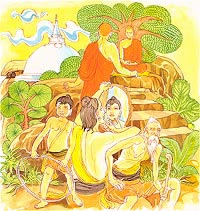
Verse 157. Safeguard Your Own Self
If one holds oneself as dear,
protected, one protects oneself.
One who’s wise should be aware
through all the watches three.
Explanation: If you are aware that you are fond of your own self then protecting it is the best safeguard. You must take measures to protect your self in one of the three stages of life – namely childhood, youth and old age. The best safeguard is the acquisition of virtue.
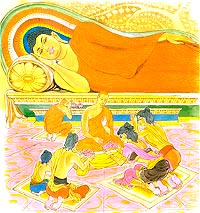
Verse 158. Giver Advice While Being Virtuous Yourself
One should first establish
oneself in what is proper.
One may then teach others,
and wise, one is not blamed.
Explanation: If you are keen to advise others, in the first instance establish yourself in the proper virtues. It is only then that you become fit to instruct others.
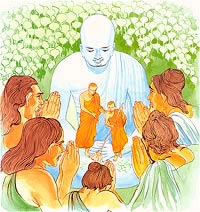
Verse 159. Discipline Yourself Before You Do Others
As one teaches others
so should one do oneself.
Well-tamed, on may tame others,
oneself to tame is hard.
Explanation: If you are keen to discipline others in the same way, you must yourself behave in that manner. It is the best disciplined person, who will disciplined others best. The most difficult to be disciplined is one’s own self indeed.

Verse 160. One Is One’s Best Saviour
Oneself is refuge of oneself,
who else indeed could refuge be?
By good training of oneself
one gains a refuge hard to gain.
Explanation: The saviour of oneself is one’s own self. What other person could be your saviour? This is a difficult kind of help – being your own saviour. It can be achieved only through self discipline.
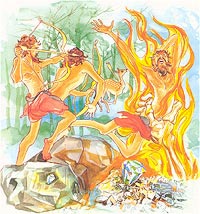
Verse 161. The Unwise Person Comes To Grief On His Own
By oneself is evil done,
it’s born of self and self-produced.
Evil grinds the unwise one
as diamond does the hardest gem.
Explanation: The diamond is born of, produced and is sprung from stone. But it cut the precious stone. The evil action is born of, produced by, and sprung from the evil doer.
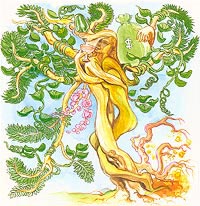
Verse 162. Evil Action Crushes The Doer
He whose conduct’s very bad
like oak-tree choked with ivy,
so he does towards himself
what enemies would wish.
Explanation: The extremely evil action of the person lacking in virtue is similar to that of the parasitic maluva creeper. The creeper grows on the tree and crushes in into destruction. The evil doer’s action too crushes himself in that way.
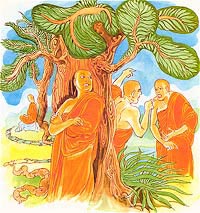
Verse 163. Doing Good Unto One’s Own Self Is Difficult
Easy is what’s bad to do,
what’s harmful to oneself.
But what is good, of benefit,
is very hard to do.
Explanation: Those actions which are very bad and harmful to one’s own self can be very easily done. But if some action is good for one’s own self; that kind of right action will be found to be difficult to do.
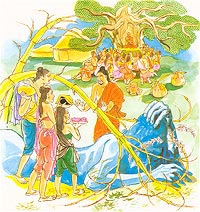
Verse 164. The Wicked Are Self-Destructive
Whatever man unwise relies
on evil views and so condemns
the Teaching of the Arahats,
or Noble Ones who Dhamma live,
he, as a bamboo fruiting,
fruits to self-destruction.
Explanation: There are some ignorant ones who, due to some harmful views, obstruct the teachings of noble saints, who conduct their lives righteously. They, like the bamboo plant that are destroyed when they bear fruit, are self-destructing.

Verse 165. Purity, Impurity Self-Created
By oneself is evil done,
by oneself defiled,
by oneself it’s left undone,
by self alone one purified.
Purity, impurity on oneself depend,
no one can purify another.
Explanation: It is by one’s own self that evil is done. It is one’s own actions that defiles a person. If a person does not commit evil action, one is purified. A person is cleansed entirely by one’s own self. One cannot purify another. Purity and impurity both depend on one’s own self.

Verse 166. Help Others – But Promote One’s Own Good
Let none neglect their good
for others’ good however great.
Know well oneself’s own good
and to that good attend.
Explanation: One should not neglect one’s own spiritual progress in the course of many acts of service to others. Be fully aware of one’s own spiritual interest, and promote one’s own higher goals

